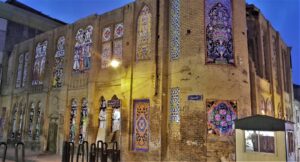
Addis Ababa, Ethiopia
Steel kicks in this belly.
Girls with threadbare braids
weave between motor beasts and cement bags.
Tin roofs give way to glass columns.
Stretching as if to pet the clouds.

Addis Ababa, Ethiopia
Steel kicks in this belly.
Girls with threadbare braids
weave between motor beasts and cement bags.
Tin roofs give way to glass columns.
Stretching as if to pet the clouds.

Moscow, ID
The neighbor children are in the Evangelical cult that Vice and The Guardian wrote about last year. They’re not allowed to speak to us, which is a thing no one has ever said aloud but is true, nonetheless. This town is full of true things that no one says aloud because we can’t or wouldn’t dare or because no one would believe us anyway.
Marilynne Robinson, I think, or maybe Ruth Ozeki, wrote something about how the wheat here is green before it’s yellow and everyone from elsewhere gets to selectively forget that and picture us golden and glowing year-round.
By URVI KUMBHAT

Kolkata, India
From my window I see a boy shaking the bougainvillea
for flowers. My parents talk of pruning it. They talk
of little else. The tree, spilling wildly past our house into
the gulley—where boys come to smoke or piss, lanky against
betel-dyed walls—acrid ammonia, posters begging for
votes, pink crowning above them. The boys linger even
when it rains. Each drop caught briefly under
the golden streetlight, and me, holding my breath.
By MARY BERGMAN

Sewer Bed Beach, Nantucket, MA
We are losing this place twice over: first to money, and then to sea. There are ways to quantify these losses: only 3,200 bushels of scallops were caught this past winter and more than $2 billion in real estate transactions were recorded last year. My parents aren’t sure where they should be buried; all the graveyards in all the towns we have ever lived will one day be inundated. I imagine horseshoe crabs trolling along the bottom, pausing to read the names etched on headstones.
All over the island, it looms: this is the end of something. I walk along the dune-tops, what’s left of them, at the very end of South Shore Road. Over one shoulder is the Atlantic; endless. Over the other are the sewer beds. A sandy strip separates the two. Second homes are not the only creatures perched precariously on eroding shorelines. Our wastewater treatment facility hangs in the balance.

Rome, Italy
Etude no. 2
in Rome a monumental marble typewriter
ticked out their story into the sky: two lovers
devour time. she lay on the lawn near Trajan’s
column. he plucked letters from her dress,
By S. G. MORADI

Iran
We grew up on salty rocks, collecting bullets,
holding onto hope as if it were a jump rope that
come our turn, would go on spinning forever
our feet never failing us.
We ran through sunburnt alleys, kicking up
clouds of dust that were quick to settle
as if somehow knowing
that we had nowhere else to go.

Yalta, Ukraine
The minibus stops in the middle of the road and the driver opens the door, he says something in Russian which I take to mean I need to get off. I begin to walk on a red dirt road that meanders down, and in front of me, the vastness of the Crimean terrain opens up, splotches of yellow overgrown grass, young bushes and wildflowers, the quiet dark sea in the distance.

Zagreb, Croatia
A couple of days ago my husband returned from the grocery store with a pound of bananas and a small coconut. The bananas were perfectly ripe for consumption, and I put them in a fruit basket. I held the coconut in my hand and noticed the beige, hairy shell covering it. The image of a coconut that I was familiar with was of a large, round fruit with a dark brown, hairy exterior. Our coconut had an elliptical shape and a groove around its widest part as if someone had chiseled into it. I read the label on it that claimed that this coconut was “easy to open.” I began to laugh aloud and was barely able to utter to my husband to cut it in half following that indentation. I didn’t believe the label, and the steps that followed in cracking it open proved me right. This coconut intrigued us both, and we wanted to taste the liquid and the white flesh inside of it. We first pierced a hole on its top and drained it. We took a sip and agreed that the liquid was flavorless. My husband had to use a hammer and pounded hard several times across the chiseled line until the coconut finally split open. After that, we proceeded to separate its meat from the outer shell. It was edible but bland, and hard to chew.
By MONA KAREEM
Translated by SARA ELKAMEL

Farwaniya, Kuwait
“Darkness alone is in my voice.” — Jean Sénac
I am of darkness.
My nation is an aging butterfly,
the desert my prayer.
I wash in rain’s saliva.
In my supplications, the sun dances
on the tips of her toes.